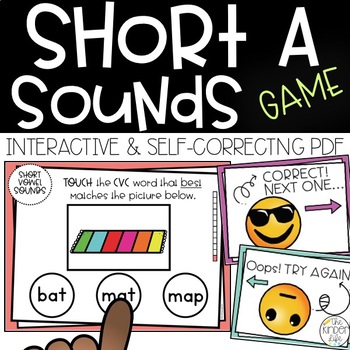

While my son may have been perfectly fine with the “Encyclopedia of Cars” and “Build Your Own Bookshelf” directions, I had to have something to “read” with him that was at least a little more enjoyable. And so, his “go-to” reading material was anything with “schematics” (think assembly instructions for a bookshelf with diagrams for pictures!)…at six years old! He was interested only in things that had wheels or made noise-neither of which applied to the average book.
#TEACHING SHORT VOWEL SOUNDS TO OLDER STUDENTS HOW TO#
This disposition didn’t last long, as soon I had my own son-who in first grade had decided that he would rather cut holes in his shirt rather than learn how to read. It was then that I started down the path of blaming parents, society, and culture in general. They simply didn’t know how to get there. Every one of them had been frustrated with the same children-not knowing how to help them, but trying to do their best.

How could a sixth grader in a regular education classroom be reading at SECOND grade level?īeing in a small school at the time, I got to know each of those teachers. When I had initially started working with struggling readers at the upper grade levels, my first reaction was to blame every teacher that they had ever encountered in earlier grades. It was at this time that I began working on my Master’s Degree in Special Education, as solving this problem would require more knowledge and tools than I currently possessed, and I was determined to help these kids! I wanted to help them, but had no idea where to start, as many were just too far behind. My work with struggling readers at the upper grade levels, many of whom were struggling with dyslexia, was an entirely different story.Īs soon as I began working with 3rd-8th grade struggling readers, I realized there was SO MUCH that I didn’t understand. I had cruised through “intervention” with my K-2 students, as at that age, they absorb pretty much everything. My second year of teaching, I was plunked into a Title I Intervention position in a K-8 school. I started reading when I was three, so OBVIOUSLY I knew everything about reading, right? Nope, not even close. I never thought about becoming a Reading Specialist at any point in my college career. If that’s the case, you are probably reading this late at night, having wrung your hands, scratched your head, and said your prayers….while continuing to search for answers. I know if you are reading this, you are probably a teacher of older students, or a parent of a struggling reader who has been told that their child “can’t read.”


 0 kommentar(er)
0 kommentar(er)
